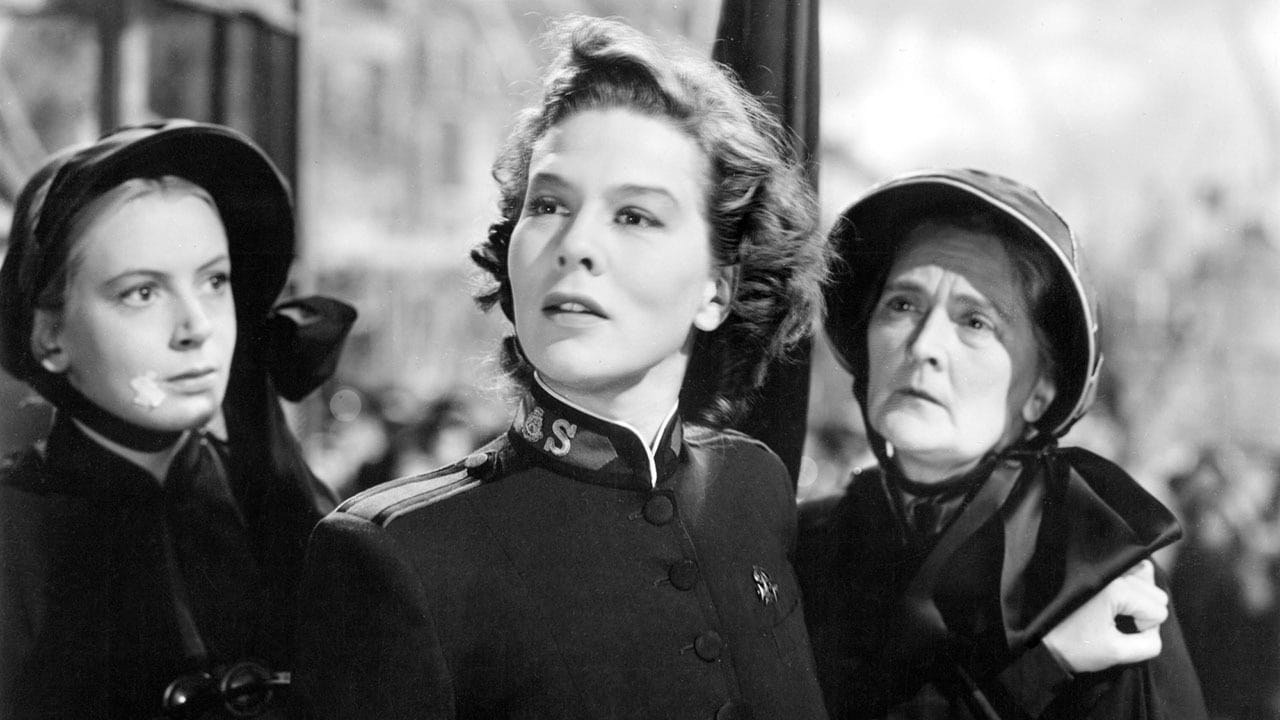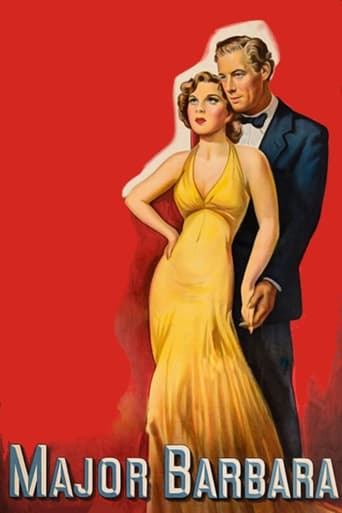

Once I asked my Sunday School class (Disciples of Christ) about an article I read about mob money given to some churches. Some of my class said however the money was earned (if "earned" is the term for mob money) it could be used for good. Then I asked what would they think if the KKK gave the same amount, and wanted it known. More demurred, though some made the argument that money itself is neither good nor evil, and it was still a good irony to take money earned from evil and turn it to good works and helping people. By rejecting it one might be taking food from the mouths of those who are in need (ours is a sharing church, not a builder of Crystal Cathedrals).Being the teacher and therefore moderator I took no part in the discussion; and it's just as well because I don't know what to think. Both sides made very good, but not altogether, persuasive arguments and I still have no opinion on the matter.This is more or less the theme of Shaw's play, written in 1905 and filmed in 1941, at the height of the Blitz, with an excellent cast. Wendy Hiller is good as the woman who loves saving souls in the Salvation Army, but who has a crisis of faith when her father, a wealthy industrialist, offers the Salvation Army fifty thousand pounds and, over her objections, accepts it.But when Barbara resigns her commission in the Salvation Army, is it pride, or her own problems with her father? Or is money really "tainted" just because it's earned from selling munitions? After all, munitions don't kill people, people kill people. (and, personally, as a capitalist I believe in earned money)The fact that he is a munitions maker is immaterial. Shaw was a Socialist and despised capital, despite the fact that the twentieth century that stretched 95 years after the play was written proved capitalism knows how to create jobs and lift the living standards of the poor but Socialism only knows how to lower all standards to equal squalor.The rest of the cast is uniformly excellent. Young professional Shavian Rex Harrison is good, and has a moment of brilliance when he's trying to pass through a trombone section of the Army. Robert Morley is a bit disappointing (I'm afraid I was expecting the arrogant Robert Morley, but he's just as good playing a pleasant-natured old munitions maker--in his thirties). The other major Robert in the cast, Newton, is his usual self, wonderfully hammy. Other familiar faces to American audiences will be Miles Malleson and Deborah Kerr, looking lovely in a very early role.Also in the credits are rising David Lean, as "assistant to the director." Curiously, Ronald Neame replaced Freddie Young as cameraman, since young would go on to have amazing success working with David Lean on his later epics.Like all Shaw's plays, it's talky. Not talky in the overly clever way of Wilde. More philosophically-talky,and eventually pedantry. And, as usual, Shaw stacks the deck in his own favor.Just as does criticism of this movie as "pro-war" or "anti-war." No one is "pro-war," but more open-minded people realize its necessity (as did American Presidents Wilson, FDR, JFK, LBJ, WJC, and BO, all of whom waged it at one time or another).Shaw is never very relevant to an American audience, since Americans never came from a caste-ridden society. And Shaw is a lot of talk, talk, talk. But if you can avoid Shaw's wicked sleight of hand, there are some good momens here, though lots of it is dull. And Shaw seems to have forgotten the Christian adage, "Money is the root of all evil," but is not evil in itself, nor are any THINGS, but from the hearts of men.
... View MoreI'm surprised that this wonderful classic from the British cinema ever got made at the time it did. Not with having one of the major characters of the play being a munitions manufacturer. Not so very long ago munitions makers were a despised lot of people and in Major Barbara, Robert Morley's character of Edward Undershaft is admirable only for the realistic way he views life.People in his profession were characterized as 'merchants of death' and were held in low repute until they were needed when the United Kingdom was fighting for its survival again. Morley's Undershaft does not redeem the name of the profession.Major Barbara was first presented on the London stage in 1905 and waited 10 years before it made its Broadway debut in 1915. Europe had a general post Napoleonic peace for nearly 100 years and war was unthinkable. The arms merchants such as they were busily made their product and the countries armed more and more. But it was thought that the guns might be used in their various colonial endeavors. When they started getting used against each other in a World War, pacifism became very popular.But in Major Barbara its author George Bernard Shaw had a different idea in mind. I think his chief reason for writing the play was to illustrate one of Karl Marx's tenets that religion was the opiate of the masses. Shaw was a Fabian socialist and wanted to see socialism come to the United Kingdom by peaceful means. But he wouldn't have disagreed with that part of Marx's diagnosis about the ills of society. He lived until 1950 and saw the post war Labour government do much of what he advocated back in the day. One wonders what he would think now of British, indeed western society in general.Morley who has been estranged from his family for years returns and finds his eldest daughter Barbara played by Wendy Hiller a Salvation Army worker in the London slums. She thinks of herself as repudiating her hated father's evil works by doing good. He finds the idea of visiting her at the mission and showing her the error of her ways as he views it.Religion then as now needs money, why are the televangelists out there begging for your currency to keep their work afloat? The Salvation Army does do a limited amount of good with their soup kitchens and blandishments against indulging too much in the vices. But what Shaw and his fellow Socialists would argue is that without a real living wage and the workers having some say in production, all this does is just keep the workers at bay with dreams of a perfect life in the next world no matter how bad this world might be for them. Major Barbara is one of Shaw's greatest polemical work and in the characters of Undershaft and Barbara he pits the material against the spiritual and the material wins in a knockout. This production has some really good casting beginning with Hiller and Morley. Rex Harrison gets one of his early cinema roles as scholar Adolphus Cusins who Morley also bends to his point of view and uses the mutual attraction of Hiller and Harrison for each other for his own ends. Deborah Kerr makes her screen debut as an innocent new salvation army lass and Emlyn Williams and Robert Newton as a pair of working class types who work the system so to speak.Major Barbara is a play set firmly in its time, I doubt it could be updated, mainly because we've passed from the Industrial Age to the Information Age because of the computer. At least that's what the sociologists will tell you. New problems have arisen and for myself I don't think the organized labor movement has quite got a handle on them. Still this fine production raises questions that we should all think seriously about.
... View MoreNo doubt influenced by the success of Pygmalion producer/director Gaby Pascal followed up three years later with a second GBS polemic masquerading as a play, in this case that old chestnut God versus Mammon best out of three, Major Barbara. Wendy Hiller had scored a personal triumph as Eliza Doolittle in Pygmalion so here she is again as the eponymous Salvation Army lass whose father happens conveniently to be a munitions manufacturer. One of the problems with Shaw in this vein is that he tended to animate cyphers rather than create flesh-and-blood characters and here a group of actors from stage and screen do what they can with what they are given to work with. There's little discernible chemistry between Hiller and Rex Harrison, Robert Morley pays homage to Charles Laughton, Emlyn Williams phones it in and it's left to stage actress Marie Lohr to provide a touch of class. Elsewhere Bobby Newton offers a prototype Bill Sikes (possibly encouraged by Editor David Lean who also gets a co-director credit. Stanley Holloway gets a strangely long opening sequence for an uncredited role and in her film debut Deborah Kerr gives little indication of the durable career to come. A curio more than anything else.
... View More"Major Barbara (1941: **1/2). A lot of talent has gone into this film version of Shaw's play about a Salvation Army lass who is disillusioned when her Mission accepts a fat check from her father, a wealthy munitions manufacturer of wartime supplies. I happened to have the play on hand and referred back to it as I wasn't sure Shaw's meanings survived the rather tedious verbosity of the movie, which sags despite a great cast (Wendy Hiller, Rex Harrison, Robert Morley, etc.). Shaw seems to be saying that when religion and capitalism fight it out, capitalism will always win as it provides jobs and shelter for the poor, whereas all religion can do is to concentrate on saving their souls. To Shaw, a man's soul is best saved when his belly is full and his future is secured. Ultimately, the girl decides it's better to labor in her father's vast factory, where she can save souls while working within the system. I believe Shaw was something of a Utopian Socialist. He called this play a "Discussion in Four Acts" and that's pretty much what the movie seemed to be.
... View More